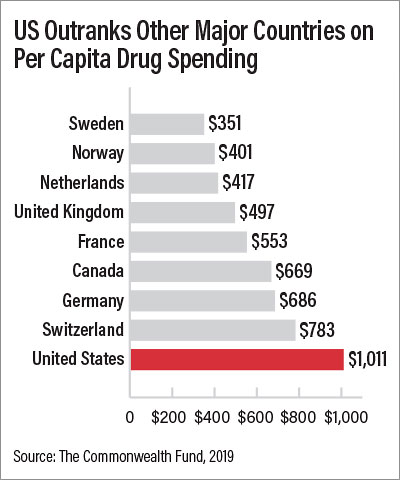Under intense pressure to deliver on a key campaign issue to provide lower-cost drugs to Americans, the Trump administration last month advanced a proposal to import less expensive prescription drugs from Canada and other countries.
The Department of Health and Human Services (HHS) issued a plan outlining two pathways for allowing drug importation from foreign markets. For the first, the administration would pass a rule allowing states, pharmacists, and wholesalers to import drugs from Canada after being approved for time-limited “pilot projects.” Once approved, the programs would be able to import drugs and be required to provide regular reporting to prove drug safety and cost conditions are met, HHS wrote.
Under the second pathway, drugmakers could import their own foreign-manufactured drugs into the United States. HHS wrote that drugmakers have stated a desire in recent years to lower their prices but contend they are hamstrung by contracts with pharmacy benefit managers and others that forbid this sort of arrangement.
Some of the most expensive psychiatric drugs include brand-name second-generation antipsychotics and injectables. Another pricey psychiatric medication is Zulresso (brexanolone), the sole medication approved for postpartum depression. The drug, which is given as a continuous infusion over 60 hours, captured headlines earlier this year for its price tag of $34,000 per treatment (
Psychiatric News).
However, the HHS proposal would exclude Zulresso and all other infused medications as well as injectable medications and all controlled substances, including suboxone, benzodiazepines, and stimulants.
Will Importing Drugs Lower Costs?
One health policy researcher did not mince words about the proposed plan. “This [proposal] is a sham and will have very little to no impact on drug affordability in the United States,” drug policy expert Joel Lexchin, M.D., a professor emeritus at the School of Health Policy and Management in the Faculty of Health at York University in Toronto, said in an emailed interview with Psychiatric News.
“First, there will be only pilot programs, and they will not start for a few years. Second, biologics and insulin will not be covered under this program, and some biologics in the United States cost in the range of $30,000 to $40,000 per year,” Lexchin said. “Third, the United States could import every pill and vial of prescription medication intended for use in Canada, and it would still only be a drop in the bucket of the American demand because Canada has only one-tenth the population of the United States.”
This is not the first time the U.S. government considered drug importation as a way to control rising drug costs. A 2003 federal law gave HHS the authority to allow the importation of drugs from Canada, if the HHS secretary could certify both safety and cost savings. To date, HHS has not made this certification. And while a handful of states piloted drug-importation programs, they were ultimately terminated after being deemed unsuccessful.
Still, the idea of importing cheaper prescription drugs from other countries holds much political appeal, perhaps because it’s an easy-to-understand concept. A majority of Americans (80%) favor importing Canadian drugs, and the idea is equally popular among Democrats and Republicans polled, according to a survey conducted by the Kaiser Family Foundation last February.
Starting in 2018, a number of states, including Colorado, Florida, Maine, and Vermont, have passed laws to create prescription drug importation programs. Other states have considered the concept, including Louisiana, Missouri, Oklahoma, Utah, West Virginia, and Wyoming. One big caveat remains: Such programs cannot go forward without obtaining approval from the federal government.
Drug Importation ‘Long Way’ Off
Canadian government officials say they weren’t consulted in advance about the details of Trump’s drug importation plan. Meanwhile, the Best Medicines Coalition, a nonprofit representing 28 Canadian patient organizations said the plan poses a “clear and present danger” to the health and well-being of Canadians because it could cause drug shortages there.
“We’re a long way from seeing any real action on drug importation from Canada resulting from the administration’s new proposal,” said Juliette Cubanski, the associate director of the Program on Medicare Policy at Kaiser. The process of HHS proposing and approving the required drug importation rule could take years; and even then, importation would be incumbent upon states or wholesalers submitting their proposals to HHS and obtaining approval, Cubanski explained. As for allowing drugmakers to import their own foreign-manufactured drugs, Cubanski said that “it’s not entirely clear why manufacturers would do that. If they chose to, they could simply reduce their prices.”
In Canada, brand-name drugs cost less than a third of brand-name drugs sold in the United States, according to a 2017 report from the Patented Medicine Prices Review Board, an independent, Canadian agency that oversees the cost of brand-name drugs there. Generic drug prices are controlled by the provinces.
Health care consumer group Families USA strongly supports the importation of prescription drugs from Canada and said it will be watching to see whether the administration follows through with this promise. “However, this is a tactic, not a policy solution,” Frederick Isasi, the executive director of Families USA, said in a statement. The underlying problem stems from “unregulated monopolistic pricing by drug companies” and will not be fixed by relying on Canada’s ability to regulate drug prices, he said.
The trade association representing drugmakers, the Pharmaceutical Research and Manufacturers of America (PhRMA), said the plan could jeopardize patients and worsen the opioid epidemic. “There is no way to guarantee the safety of drugs that come into the country from outside the United States’ gold-standard supply chain. Drugs coming through Canada could have originated from anywhere in the world and may not have undergone stringent review by the [Food and Drug Administration],” Stephen J. Ubl, PhRMA president and CEO, said in a statement.
APA continues to engage with its membership to assess its response to various legislative proposals intended to lower drug costs. The Association is concerned about the impact of imposing caps on formularies and the use of prior authorization protocols. ■
The HHS “Safe Importation Action Plan” is posted
here. The HHS press release is posted
here. The Kaiser Family Foundation Health Tracking Poll on Prescription Drugs is posted
here. The 2017 Patented Medicine Prices Review Board report is posted
here.



